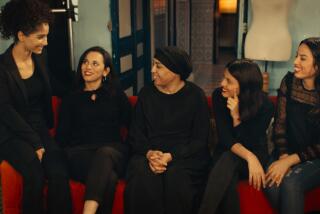Protests raise hope for women’s rights in Egypt
Reporting from Cairo — Of all the astounding things that Rihab Assad has witnessed during these days of tumult, one stood out for her: the sight of a woman with a megaphone leading a crowd of demonstrators in chants.
“And all of these men just chanting after her, repeating what she said,” said Assad, an office manager in her 40s who lives in Cairo. “To me, this was something entirely new.”
For many Egyptian women, the massive street demonstrations that have shaken the authoritarian rule of President Hosni Mubarak have also raised hopes of a more personal brand of liberation. Long treated as second-class citizens, the women say they have found an unexpected equality on the front lines of the protest.
Almost from the outset of unrest that erupted nine days ago, women and girls have made up a substantial presence in Tahrir Square, Cairo’s central plaza, which quickly became the focal point of the struggle. Gaggles of teenage girls, dignified matrons and white-haired grandmothers have trekked daily to the square, swelling the crowd at a time when numbers were a crucial gauge of opposition power.
Although most senior leaders of the loose coalition of anti-government groups are men, women have proved themselves to be adept grassroots organizers, taking up visible tasks such as carrying out identity checks and searching bags of women entering the square.
“I was brought up to believe I was powerless,” said 23-year-old Reem Hatem, a middle-school teacher who lives in Giza, in the shadow of the pyramids. “But this was a chance to send a message that no, we’re not weak and sitting at home and being afraid. This is a way of telling men something.”
Egyptian women often shun crowded public places, fearing the pervasive sexual harassment that is the norm here. Simply walking down a Cairo street can be an ordeal of catcalls, pinching and unwanted propositions. But women attending the protests reported being treated with an unaccustomed respect.
“It’s the first time I felt that men and women are equal in this country,” said Engi Mahmoud, a 16-year-old who wears a hijab, the head covering of an observant Muslim woman. “I’m happy not to feel inferior for once.”
Within the Muslim world, the status of Egyptian women is considered enviable. They can drive cars, dress in secular fashion, attend university. But there also is domestic violence, workplace discrimination, restricted legal rights and a dramatic underrepresentation in leadership roles.
The egalitarian tone of the anti-Mubarak protests may have changed irrevocably Wednesday, when presidential loyalists stormed the square, wielding clubs and stones. The celebratory feel of the gathering immediately vanished, and the ranks of assailants and defenders alike were mainly male.
Still, female protesters felt that their participation in such a watershed public event would not go unnoticed.
“There are deep-rooted cultural practices that will not change overnight,” said Reem Naguib, who has spent every day this week in the square.
“Before all this, I wasn’t very hopeful about women in this country improving their condition,” said Naguib, 29, a doctoral candidate at Northwestern University who is home in Egypt while she works on her dissertation.
“But this is a protest against patriarchy in all its forms, and that is the kind of thinking that can find its way into every home. It’s a revolution in how we’re perceived.”
Special correspondent Doha Al Zohairy contributed to this report.
More to Read
Sign up for Essential California
The most important California stories and recommendations in your inbox every morning.
You may occasionally receive promotional content from the Los Angeles Times.










